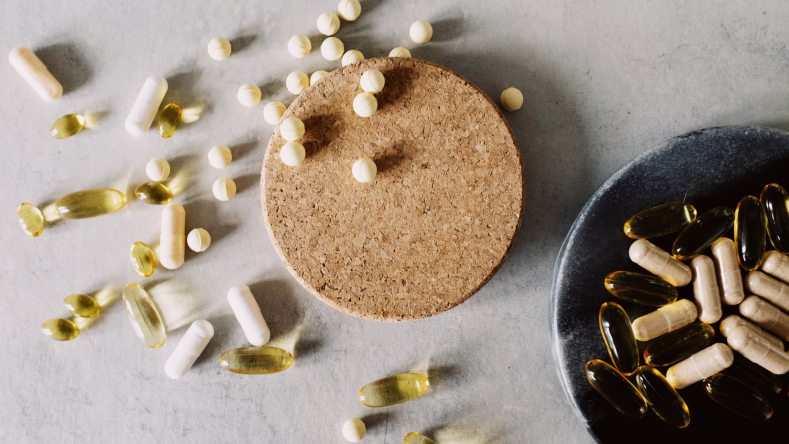What supplements should I take on a ketogenic diet?
This question is about Nutrition
Supplements you should take on a ketogenic diet include a B-complex vitamin, Vitamin D, potassium, magnesium, and a daily omega-3. In addition, fiber and medium-chain triglyceride (MCT) supplements may also be beneficial.
B vitamins
B vitamins (B1, B2, niacin, pantothenic acid, B6, biotin, folate, and B12) are essential for nutrient metabolism and energy production. With the exception of B12, these vitamins are not stored in the body, which means they’re especially important in your daily diet.
Some keto-friendly foods like meat, fish, nuts, and eggs are good sources for some B vitamins, however other good sources like whole grains, cereal, bread, beans, lentils, milk, and fruit are often avoided on the keto diet. A simple multivitamin or B-complex supplement can help fill gaps in your B vitamin intake while you’re on the keto diet.
Vitamin D
Vitamin D is important for numerous functions including calcium absorption, reducing inflammation, supporting immunity and bone health. Going keto won’t necessarily put you at greater risk for vitamin D deficiency, but it can make it difficult to get enough from your diet, especially if you pass on breakfast cereals and dairy products like milk and yogurt. Taking a vitamin D supplement is a good idea for most individuals - keto or not - since vitamin D deficiency is highly prevalent.
Magnesium and potassium
During the first few weeks of keto, glycogen (stored carbohydrate) is released, along with fluid and electrolytes such as sodium, potassium, and magnesium. Dietary replenishment of these electrolytes is limited on the ketogenic diet since many magnesium- and potassium-rich foods, like potatoes, fruit, and beans, are also rich in carbohydrates. Combined, these two factors can lead to electrolyte imbalances and contribute to common symptoms of keto induction, including cramping, brain fog, dizziness, fatigue, headaches, and impaired muscle function.
Replacing essential electrolytes during the first several weeks can help minimize the risk for dangerous imbalances and reduce the severity of the typical “keto flu” symptoms [ 1
When choosing magnesium and potassium supplements, look for magnesium citrate and potassium chloride as these forms are best absorbed and easier on the digestive tract. Too much potassium can lead to irregular heart rhythms (and in severe cases, heart attack), so work with a healthcare provider to make sure you’re taking a safe dose. In general, increasing potassium intake by 500-1,000 mg/day with a salt substitute seems sufficient for most benefits and does not appear to pose any risk when taken with food [ 5
Omega-3
Omega-3 supplements can be particularly beneficial for keto dieters as they can help maintain a healthy omega-3 to omega-6 ratio while consuming a high-fat diet. Additionally, they may also be beneficial for reducing triglycerides, insulin, and inflammation markers [ 2
Fiber
While it’s possible to get enough fiber from keto-friendly foods like avocados, nuts, seeds, leafy greens, and other low-carb veggies, it can be difficult because higher-carb foods (such as whole grains, beans, and fruit) are strictly limited on the keto diet. A daily fiber supplement, like psyllium husk, paired with plenty of water, can help you keep your fiber intake up and promote a healthy digestive tract.
MCT oil
Some evidence suggests supplementing with medium-chain triglycerides (commonly marketed as MCT oil) can help reduce symptoms of keto-induction and increase fat intake to help you achieve and stay in ketosis [ 3 4

People also ask:
References:
Masood W, Annamaraju P, Uppaluri KR. Ketogenic Diet. [Updated 2021 Aug 22]. In: StatPearls [Internet]. Treasure Island (FL): StatPearls Publishing; 2021 Jan-. Available from:
https://www.ncbi.nlm.nih.gov/books/NBK499830/
Paoli, A., Moro, T., Bosco, G., Bianco, A., Grimaldi, K. A., Camporesi, E., & Mangar, D. (2015). Effects of n-3 polyunsaturated fatty acids (ω-3) supplementation on some cardiovascular risk factors with a ketogenic Mediterranean diet. Marine drugs, 13(2), 996–1009.
https://doi.org/10.3390/md13020996
��D C Harvey, C. J., Schofield, G. M., Williden, M., & McQuillan, J. A. (2018). The Effect of Medium Chain Triglycerides on Time to Nutritional Ketosis and Symptoms of Keto-Induction in Healthy Adults: A Randomized Controlled Clinical Trial. Journal of nutrition and metabolism, 2018, 2630565.
https://doi.org/10.1155/2018/2630565
Liu, Y. M., & Wang, H. S. (2013). Medium-chain triglyceride ketogenic diet, an effective treatment for drug-resistant epilepsy and a comparison with other ketogenic diets. Biomedical journal, 36(1), 9–15.
https://doi.org/10.4103/2319-4170.107154
Patel, K. (2020, January 29). Potassium. Examine.Com. Retrieved December 6, 2021, from
https://examine.com/supplements/potassium/
